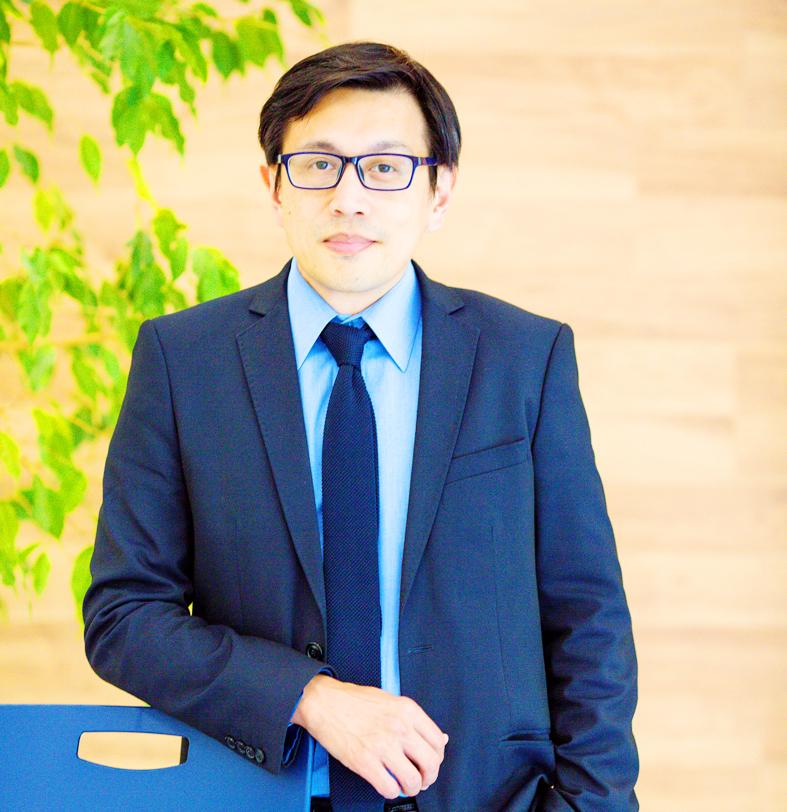A record number of exhibitors are to participate in Semicon Taiwan, an annual international trade fair for the semiconductor technology sector, when it opens today in Taipei, the organizers said on Sunday.
The event, which was postponed from September due to a local COVID-19 outbreak, is to feature 2,150 booths from 650 exhibitors, the highest number since the trade fair was first held in 1996, said a statement by SEMI, an organization that connects about 2,400 member companies and 1.3 million professionals worldwide to advance the business and technology of electronics design and manufacturing.
The record number of exhibitors this year is evidence of Taiwan’s central position in the global semiconductor industry, said Terry Tsao (曹世綸), chief marketing officer at SEMI and president of SEMI Taiwan.

Photo courtesy of SEMI via CNA
Participation in the show should not be affected significantly by COVID-19 travel restrictions, Tsao said, adding that most of the buyers are based in Taiwan, while the international clients have local representatives.
An expected highlight at the event is to be a special Compound Semiconductor Innovation Zone, he said, adding that compound semiconductors are likely the future of the industry, as silicon chips are reaching their limit.

In Italy’s storied gold-making hubs, jewelers are reworking their designs to trim gold content as they race to blunt the effect of record prices and appeal to shoppers watching their budgets. Gold prices hit a record high on Thursday, surging near US$5,600 an ounce, more than double a year ago as geopolitical concerns and jitters over trade pushed investors toward the safe-haven asset. The rally is putting undue pressure on small artisans as they face mounting demands from customers, including international brands, to produce cheaper items, from signature pieces to wedding rings, according to interviews with four independent jewelers in Italy’s main

Japanese Prime Minister Sanae Takaichi has talked up the benefits of a weaker yen in a campaign speech, adopting a tone at odds with her finance ministry, which has refused to rule out any options to counter excessive foreign exchange volatility. Takaichi later softened her stance, saying she did not have a preference for the yen’s direction. “People say the weak yen is bad right now, but for export industries, it’s a major opportunity,” Takaichi said on Saturday at a rally for Liberal Democratic Party candidate Daishiro Yamagiwa in Kanagawa Prefecture ahead of a snap election on Sunday. “Whether it’s selling food or

CONCERNS: Tech companies investing in AI businesses that purchase their products have raised questions among investors that they are artificially propping up demand Nvidia Corp chief executive officer Jensen Huang (黃仁勳) on Saturday said that the company would be participating in OpenAI’s latest funding round, describing it as potentially “the largest investment we’ve ever made.” “We will invest a great deal of money,” Huang told reporters while visiting Taipei. “I believe in OpenAI. The work that they do is incredible. They’re one of the most consequential companies of our time.” Huang did not say exactly how much Nvidia might contribute, but described the investment as “huge.” “Let Sam announce how much he’s going to raise — it’s for him to decide,” Huang said, referring to OpenAI

Nvidia Corp’s negotiations to invest as much as US$100 billion in OpenAI have broken down, the Wall Street Journal (WSJ) reported, exposing a potential rift between two of the most powerful companies in the artificial intelligence (AI) industry. The discussions stalled after some inside Nvidia expressed concerns about the transaction, the WSJ reported, citing unidentified people familiar with the deliberations. OpenAI makes the popular chatbot ChatGPT, while Nvidia dominates the market for AI processors that help develop such software. The companies announced the agreement in September last year, saying at the time that they had signed a letter of intent for a strategic